
views
Deciding When To Use A Garment Bag

Consider the travel itinerary carefully. Typically garment bags are used to keep formal or business attire wrinkle-free. Make a list of the different functions you will need to attend so you can be certain you’ll have everything you need. Casual clothing typically is not worth packing in a garment bag. Instead, fold it in a suitcase.

Pack as few items in a garment bag as possible. Garment bags can be bulky and are not always an efficient way to pack clothing. If your wardrobe can be folded in a carry-on or other suitcase, pack it there. Dress shirts, ties and accessories do not need to be hung in a garment bag. Business casual slacks, such as khakis, can generally be folded and stowed in a suitcase. When possible, pack clothing that has been treated to be wrinkle-free.
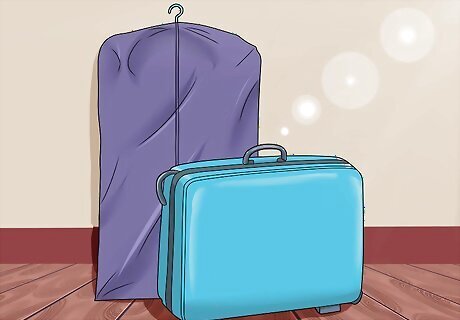
Use a garment bag for business trips. The best time to use a garment bag is for a short trip when most of the clothing you need will be for business. The limited capacity of most garment bags makes them ideal for a trip that lasts only a few days and so does not require a great variety of clothes. For an extended trip that mixes business and leisure, use both a garment bag and another suitcase to carry all your clothes.

Ask a professional to pack your wedding dress. If you are traveling to a formal event such as a wedding or an award ceremony, your gown may be too bulky or ornate to use an ordinary garment bag. Bring a carry-on sized suitcase to the wedding dress company and have it packed professionally. Using a carry-on will guarantee you can keep an eye on your special item. Some airplanes have closets for flight attendants in which you may be able to hang your bag, but don’t count on it. A carry-on is a safer bet. The dress may need to be steamed when you arrive at your destination.
Packing Your Garment Bag
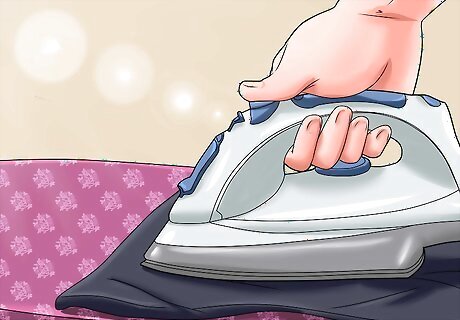
Wash and iron clothing prior to putting it in a garment bag. If appropriate, dry-clean items should be taken to the cleaners well in advance so you are assured they will be returned in time for your trip. Starting off with clean, ironed items will help you to have less work when you arrive at your destination. Test zippers and check for missing buttons before you pack so you will not have to try to repair things while you are away.

Stuff the arms and legs of your garments lightly with white tissue paper to maintain the shape and prevent wrinkles. White tissue is preferable in the event that your bag gets wet. Colored tissue has dye that may bleed onto your garments.

Use your schedule to determine packing order. Referring to your itinerary of events, place items you will need later in your trip at the back of the garment bag, and items you will need sooner at the front. This step will help prevent you needing to rummage past garments to find what you need, causing wrinkles.

Hang the garments on hangers. Some garment bags come with built-in hangers while other types of bags require separate hangers. If you use your own hangers, wire hangers are best because they are lightweight and take up less space than wooden or plastic hangers. Save space by hanging several items on each hanger. For example, hang a shirt under a jacket or blazer, with the sleeves of the shirt placed in the sleeves of the jacket. Slide a belt or scarf over the hanger. Use pant hangers to secure pants or skirts. The less items move, the less they will wrinkle.
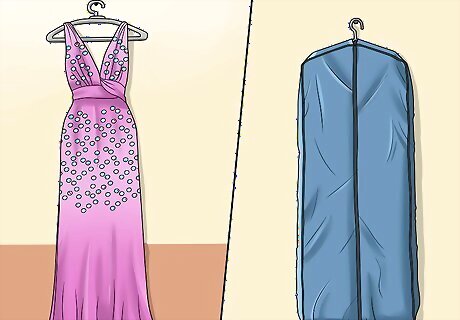
Use the ribbons inside formal pieces to attach them to dress hangers. This prevents stretching from the weight of the clothing pulling against the shoulder straps. This is especially important for gowns with trains, beaded dresses or other heavy items.

Close all the garment fasteners. This is to keep the garments secure and prevent wrinkles. Zip the zippers, snap the snaps and button the buttons.

Place a plastic dry cleaning bag over each hanger. Plastic prevents wrinkles caused by the friction of garments rubbing together.
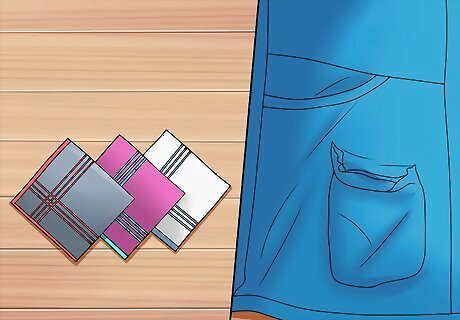
Use interior pockets. Pack underwear, cosmetics, handkerchiefs, and other small items in the garment bag's inside pockets. If you are also using a carry-on or other suitcase, place smaller items in there. This step prevents small objects from wrinkling the clothing on the hangers.
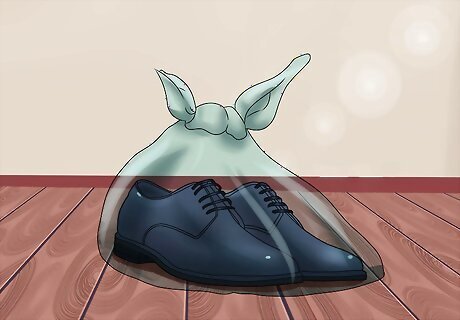
Place your shoes in a cotton shoe bag or a plastic grocery bag. Save space by packing socks inside the shoes. Stow the shoes in the bottom of the garment bag. Putting shoes in a plastic bag is important to prevent dirt or shoe polish from getting on your clothes.
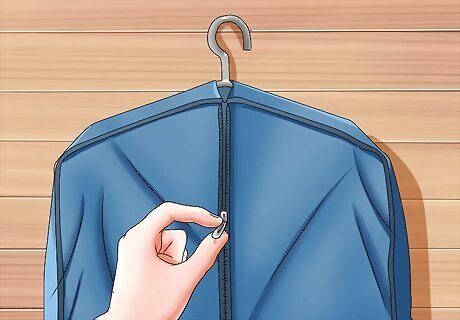
Fasten your garment bag. Most garment bags are designed to be their own carry-on. Depending on the bag, carefully fold it in half or in thirds. Use provided zippers or snaps to secure the bag. It will look something like a briefcase. Pay attention when you first open the bag to how it works so you can refold it smoothly when it is full. Consider practicing folding the bag before you put clothes in. If folded or fastened incorrectly, you may create more wrinkles in your clothes.
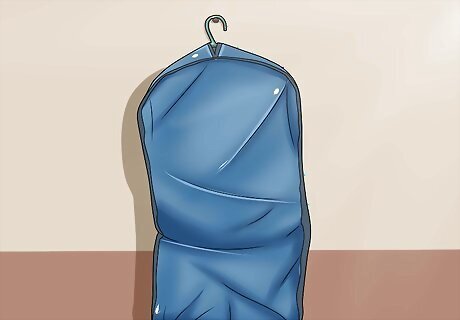
Use a dry-cleaner bag. If you have a garment protector bag that hangs in your closet and is not designed as its own suitcase, you can still use it to travel. Zip the bag shut, then carefully fold it into thirds so that it fits neatly inside a suitcase. Avoid using a duffel bag. A suitcase with firm sides will provide better protection and support. Pack enough items in the suitcase to prevent the garment bag from shifting and bunching, but avoid stuffing it so full that clothing will be crushed. Pack the garment bag last so that the weight of other clothing does create wrinkles in your suit or dress.
Unpacking Your Garment Bag When You Arrive
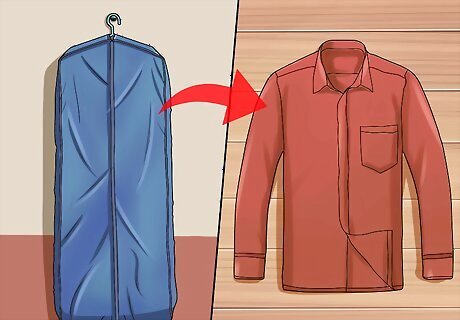
Remove the garments from the garment bag as soon as possible. As soon as you arrive at your destination, hang the garments in the closet, so any wrinkles have time to relax.
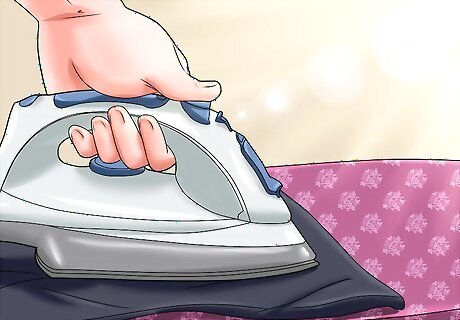
Iron your clothes if necessary. Many hotels offer ironing boards and irons free of charge. If any items will need ironing, take the opportunity to do all of them at once so you will not have to try to remember later when you may be in a hurry. Read the labels of your clothing carefully and set the iron temperature accordingly. Begin ironing in an inconspicuous area, such as a shirt-tail in case you accidentally damage your clothes. Avoid ironing irreplaceable items, such as an evening gown. These items are often difficult to iron or made of fragile fabrics.

Steam clothing. One way to remove wrinkles is to use warm steam. Hanging clothing in the bathroom and then taking a hot shower will relax the wrinkles in your clothes. Alternatively, you could dampen the item with a washcloth then use an electric hairdryer to generate steam. Natural fibers absorb moisture, so this process will work with silk, wool, cotton or other natural materials. Synthetic fabrics such as rayon or polyester do not absorb moisture, so steaming will not remove wrinkles. You can wash and dry polyester or use an iron to remove wrinkles.
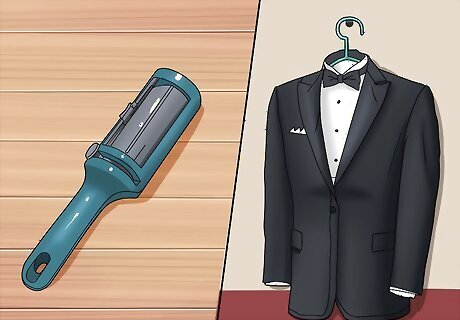
Remove lint. Use a small lint brush or roller to remove any dust or fuzz from your clothes.

















Comments
0 comment